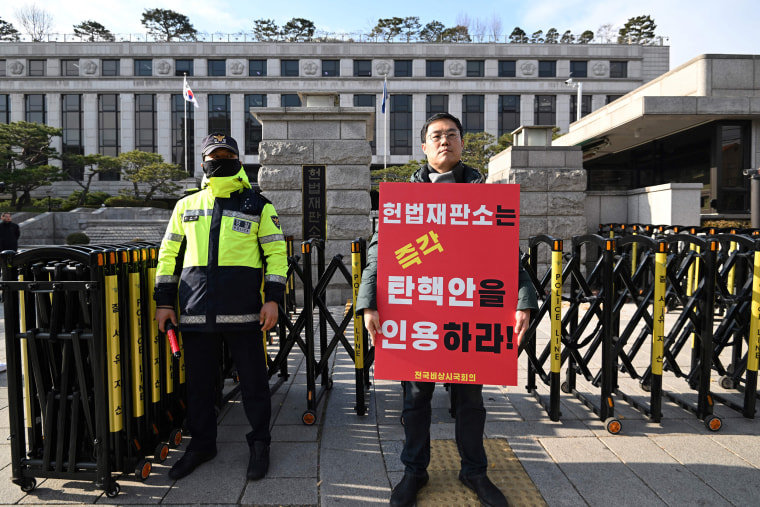
South Korea’s SEOUL Yoon Suk Yeol, the president of South Korea, has not answered a request to be questioned over his unsuccessful effort to impose martial law.
According to the prosecutor’s office, Yoon was still assembling his legal defense team when they requested him to come in for interrogation on Sunday as part of their investigation. On Monday, prosecutors intended to send out another summons.
By a vote of 204 to 85, Yoon was impeached on Saturday and is currently under criminal investigation for potential rebellion charges. Prime Minister Han Duck-soo became interim president after his presidential powers were immediately suspended.
Following his impeachment, Yoon delivered a forceful address in which he outlined his accomplishments since taking office in 2022, including the formation of an atrilateral security relationship with Japan, South Korea’s longstanding adversary, and the United States.
I am not going to give up. “I’ll try my hardest for our nation,” Yoon declared.
Investigators may seek a judge to issue an arrest warrant for Yoon if he continues to refuse to be questioned during the two inquiries.
According to a representative of the recently established Joint Investigation Headquarters, a different team of investigators from the police, defense ministry, and anti-corruption organization failed to deliver a summons to appear for questioning on Wednesday, Yoon’s 64th birthday, on Monday.
According to the individual who spoke to media, the presidential security service declined to accept the request paperwork, stating that it was outside the scope of their services.
However, we also sent out the attendance notice by mail, so there won’t be any issues getting the word out, he continued.
The Constitutional Court of South Korea began considering Yoon’s impeachment on Monday because to the brief martial law decree that shocked the East Asian democracy and important U.S. ally.
Although Yoon has expressed regret for imposing martial law, he claimed that the opposition-controlled parliament had no other option because it had paralyzed the administration. After lawmakers unanimously rejected the directive, which prohibited any political action and controlled the news media, Yoon revoked it just hours after he announced it on Dec. 3.
His impeachment, which many members of his party opposed, has caused internal division among his party. On Monday, party leader Han Dong-hoon announced his resignation and asked MPs to support the second impeachment resolution.
Constitutional Court spokesperson Lee Jin informed reporters Monday that the court has six months to determine whether to remove Yoon from office, and that his impeachment trial is scheduled to start on December 27. A presidential by-election will be held within 60 days after Yoon’s removal or resignation.
After Park Geun-hyein in 2016, Yoon is the second consecutive conservative president of South Korea to be impeached.
Allies spooked
Concerns that nuclear-armed North Korea, which is still technically at war with the South, might try to exploit the situation have alarmed markets, the U.S., and other allies. South Korea’s political unrest has resulted in the resignation or arrest of several high-ranking defense and military officials.
Following Yoon’s impeachment, those worries seem to be abating. According to CNBC, South Korean markets ended Monday in a mixed state, with the benchmark Kosdaq closing the day 0.69% higher and the blue-chip Kospi losing 0.22%.
In a phone conversation with President Joe Biden on Sunday, acting President Han Duck-soo assured him that South Korea would continue to implement its foreign and security policy.
In light of North Korea’s increased cooperation with Russia and its threats, he added, it is critical that the United States and South Korea strengthen their combined defense posture.
The White House readout states that Biden reiterated the unwavering nature of the U.S. partnership with South Korea, which is home to around 30,000 American troops, and conveyed his gratitude for the country’s democracy and rule of law.
State-run news agency KCNA reported on Monday on Yoon’s impeachment and the sizable crowd of demonstrators who gathered outside the National Assembly in Seoul in support of Saturday’s impeachment vote. In North Korea, state media did not cover Yoon’s declaration of martial law until a week after it occurred.
Although there were smaller rallies in support of Yoon, Yonhap reported, citing the police, that turnout was estimated to be around 200,000.
Following the passage of the impeachment resolution on Saturday, Lee Jae-myung, the leader of the main opposition Democratic Party, told the audience outside the National Assembly that the people made this happen.
Lee said his party would work with attempts to restore stability and demanded a speedy impeachment trial on Sunday.
He stated that because too much impeachment would generate uncertainty, he would not pursue the impeachment of Han, the acting president, for his suspected involvement in the imposition of martial law.
Jennifer Jett reported from Hong Kong, and Stella Kim from Seoul.
Note: Every piece of content is rigorously reviewed by our team of experienced writers and editors to ensure its accuracy. Our writers use credible sources and adhere to strict fact-checking protocols to verify all claims and data before publication. If an error is identified, we promptly correct it and strive for transparency in all updates, feel free to reach out to us via email. We appreciate your trust and support!
